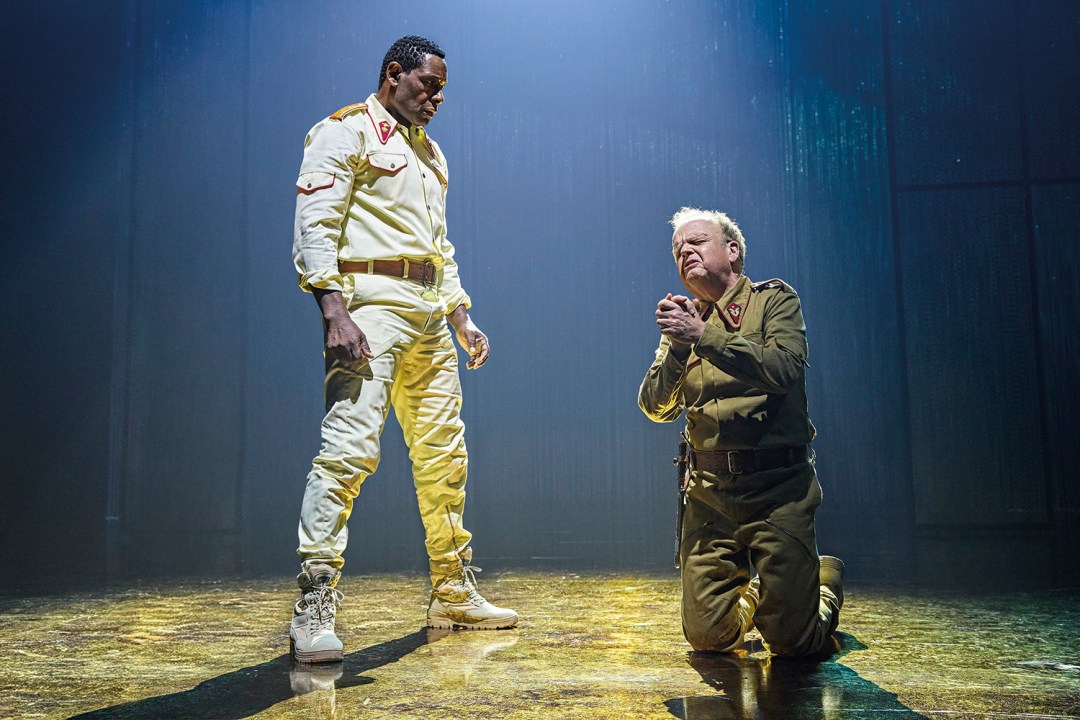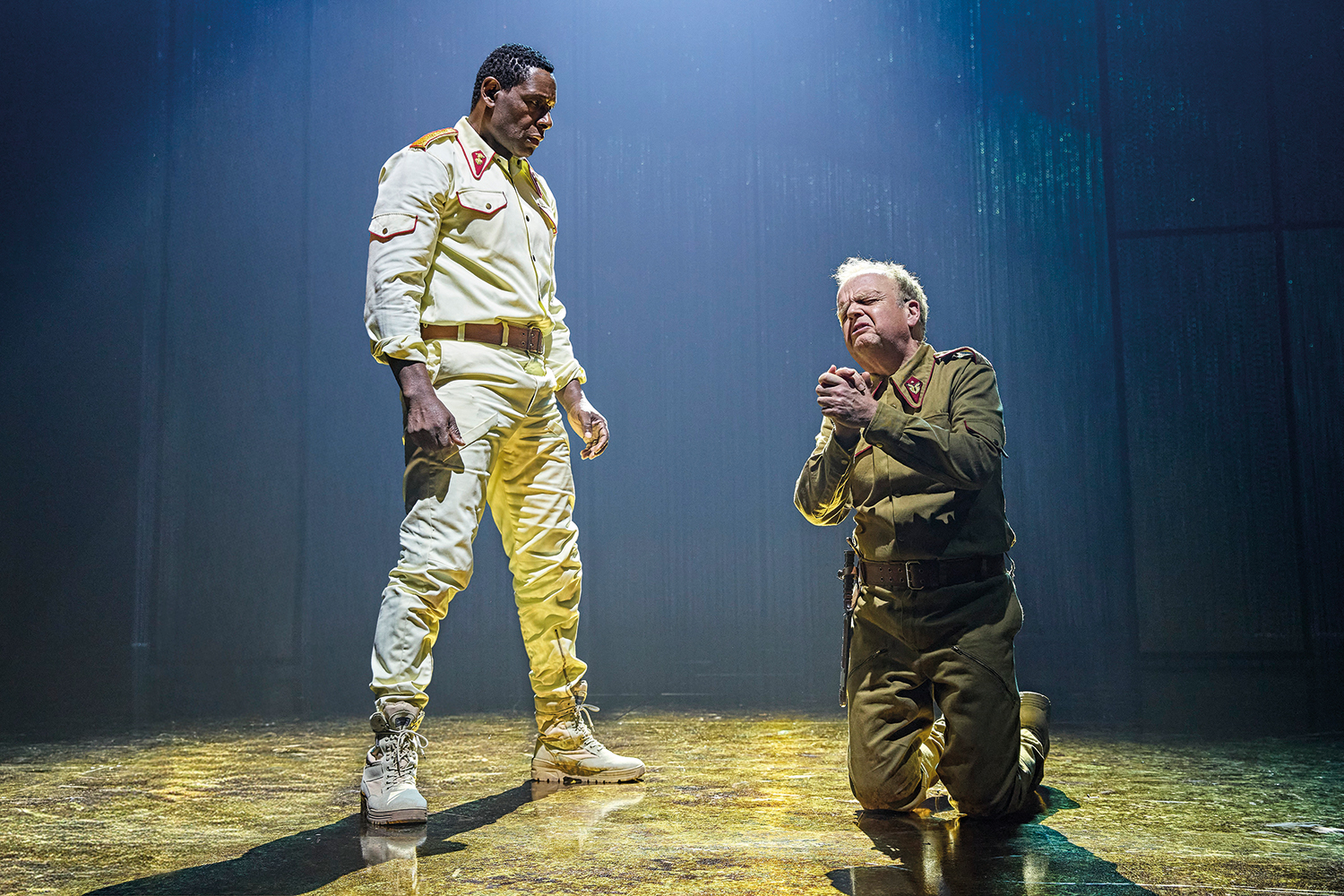
Othello directed by Tom Morris opens with a stately display of scarlet costumes and gilded doorways arranged against a backdrop of black nothingness. This is Venice at night with no hint of sea or sunshine. Crimson-robed senators gather to discuss Othello’s alleged abduction of Brabantio’s daughter. And here he comes, David Harewood as the Moor, wearing a gauche two-tone suit like a tasteless guest at a wedding. The scene is stiff, arid and over-ornate but the show opens up when the location shifts to Cyprus. Warmth and light fill the stage and the costumes improve. Othello and his men wear creamy white battle fatigues that look stylishly and subtly masculine.
Toby Jones (Iago) is too petite to play a warrior at a time when hand-to-hand combat was part of every soldier’s repertoire but his impish persona makes up for it. That squashy pug-dog face is maddeningly and wonderfully hard to read. Is he a harmless nobody or a monster plotting atrocities from behind a mask of blandness? Great casting. This is a persistently cold and unpleasant Iago. His moments of cheeky banter with Desdemona have been side-lined, and he doesn’t mention his suspicion that Othello seduced his wife, Emilia.
This deletes a key ingredient from his enmity towards the Moor and it makes Othello seem even more perfect. Perhaps unnecessarily. Harewood’s Othello is a compelling portrait of heroism, nobility and high-minded courage. Physically dominant, spiritually magnetic, effortlessly charismatic, he seems almost semi-divine. He’s the kind of warrior-poet who reads epic verse in his tent while ordering his troops to vanquish yet another enemy. When he realises his error in committing murder, he elicits a wave of nervous giggling from the crowd. A good sign. His downfall is so sudden that an eruption of laughter is the natural response. And the viewers keep bursting into outraged guffaws whenever Iago’s sincerity is mentioned. ‘Honest, honest Iago,’ says Othello, as chuckles of disbelief break from the audience.
This is a sublime version of a play that can easily wrong-foot an unwary director. Not faultless but close
Caitlin Fitzgerald’s Desdemona is so simple, beautiful and pure of heart that she exposes a fault in the play. Is she real? Surely no mortal could tolerate Othello’s aggressive abuse with such sugary forbearance. Shakespeare even asks her to forgive her killer with her dying breath. ‘Who hath done this?’ says Emilia. ‘I myself,’ replies Desdemona, hinting that she took her own life. ‘Commend me to my kind lord.’
That famous exchange has been dropped because a modern audience would flinch to hear a female victim exonerating her murderer. Not that the viewers are spared. The gruesome details of the homicide, involving audible bone fractures, are delivered with perhaps too much realism. This is a sublime version of a play that can easily wrong-foot an unwary director. Not faultless but close.
Jean Genet based his 1947 classic, The Maids, on a notorious murder case from the 1930s. A tyrannical employer was bumped off by her serving girls and Genet took this grisly tale and turned it into a surreal thriller. Relocated to modern London, this version will mystify playgoers unless they’ve done their homework. The female boss is now an east Asian millionairess with an Australian accent who forces her well-spoken English maidservants to call her ‘Madame’. The girls are paid a pittance to promote Madame’s wildly successful career as an influencer.
Already the set-up makes no sense. Madame is a psychotic bully who abuses the maids behind closed doors and although they hate and fear her they seem unable to leave. Very odd. They want to take revenge but instead of filming Madame during a violent tantrum and sharing the footage online, they decide to execute her. Here’s their plan. Her teacup will be secretly laced with an overdose of barbiturates. Since the maids are the only people with access to Madame’s teacup, their chances of evading detection seem slim.
Never mind. The show is superficially entertaining and it may please those who enjoy glamour and frenetic energy and who don’t care much about narrative logic. But it soon gets tiresome. The maids spend ages amusing each other with the distortion filters and special effects apps on their phones. Their pranks are simultaneously projected on to the back wall of Madame’s walk-in wardrobe. But the footage is ugly and shapeless.
And why showcase these digital apps and visual trinkets? They were old hat five years ago. The use of projected imagery breaks the unspoken covenant between the theatregoer and the playhouse. We love the theatre because it takes us away from the realm of digital make-believe. The last thing a playgoer wants is a toxic monsoon of meaningless pixels. The final ten minutes of the show are dominated by a kaleidoscopic sequence of phone-camera footage accompanied by howling, bombastic music. It could be a schoolkid’s first attempt at a home movie. A playhouse ought to show the work of great drama directors, not failed filmmakers.









Comments